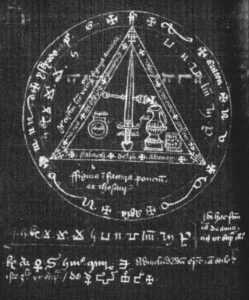In Medieval England Magic was a Service Industry Used by Rich and Poor Alike
Informative article by Tabitha Stanmore for The Conversation..
Chances are that when you hear the words “medieval magic”, the image of a witch will spring to mind: wizened old crones huddled over a cauldron containing unspeakable ingredients such as eye of newt. Or you might think of people brutally  prosecuted by overzealous priests. But this picture is inaccurate.
prosecuted by overzealous priests. But this picture is inaccurate.
To begin with, fear of witchcraft – selling one’s soul to demons to inflict harm on others – was more of an early modern phenomenon than a medieval one, only beginning to take hold in Europe at the tail end of the 15th century. This vision also clouds from view the other magical practices in pre-modern England.
Magic is a universal phenomenon. Every society in every age has carried some system of belief and in every society there have been those who claim the ability to harness or manipulate the supernatural powers behind it. Even today, magic subtly pervades our lives – some of us have charms we wear to exams or interviews and others nod at lone magpies to ward off bad luck. Iceland has a government-recognised elf-whisperer, who claims the ability to see, speak to, and negotiate with the supernatural creatures still believed to live in Iceland’s landscape.
While today we might write this off as an overactive imagination or the stuff of fantasy, in the medieval period magic was widely accepted to be very real. A spell or charm could change a person’s life: sometimes for the worse, as with curses – but equally, if not more often, for the better. READ MORE